广州新教材(2013版)八上U2Numbers课文
广州新版八年级unit numbers 数词讲解

数词数词分基数词和序数词。
基数词表示数目,序数词表示顺序。
.1.基数词(1)基数词的具体形式如下:A.从1——10B.one,two,three,four,five,six,seven,eight,nine,ten.B.从11——19eleven,twelve,thirteen,fourteen,fifteen,sixteen,seventeen,eighteen,nineteen.注:标记为加粗的单词特殊记忆,其他的词都是由其个位数形式后添加后缀-teen构成。
C.从21——99整数几十中除twenty,thirty,forty,fifty,eighty为特殊形式外,sixty,seventy,ninety都是其个位数形式后添加后缀-ty构成。
表示几十几时,在几十和个位基数词形式之间添加连字符“-”21twenty-one76_____________89_______________99_____________35_______________63_________________47______________54________________23__________________D.百位数个数基数词形式加“hundred”,表示几百,在几十几与百位间加上and.101ahundredandoneE.千位数以上从数字的右端向左端数起,每三位数加一个逗号“,”。
从右开始,第一个“,”前的数字后添加thousand (千),第二个“,”前面的数字后添加million(百万),第三个“,”前的数字后添加billion(十亿)。
然后一节一节分别表示,两个逗号之间最大的数为百位数形式。
2,648twothousandsixhundredandforty-eight同步练习()1.–Howlongisthenewbridge?Doyouknow?--Yes.It’sabout_____.A.onethousandonehundredandeightymetersB.onethousandandonehundredfiftymetersC.twothousandsonehundredfortymetersD.twothousandsseventyandthreemeters()2.Thereare____daysinayear.A.threehundredandsixty-fiveB.threehundredandsixtyfiveC.threehundredsixty-fiveD.threehundredsandsixty-five()3.Nanjingisacitywithmanyplacesofinterest.___touristscomehereeveryyear.A.ThousandofB.ThousandC.T housandsD.Thousandsof()4.–HowmanypeoplearethereinChangsha?--Aboutsix_____.lionlionslionsof()5.—HowmanypeoplewillcometoBeijingfortheOlympicGamesin2008?--It’shardtosay._____people,Ithink.lionoflionsofC.TwomillionsofD.Twomillionof(2)基数词的用法A.基数词在表示确切的数字时,不能使用百、千、百万、十亿的复数形式;但是,当基数词表示不确切数字,如成百、成千上万,三三两两时,基数词则以复数形式出现。
2013年广州版八年级英语上册课文目录及单词汇总-8745

数字_________________________ 指示_________________________ 检查,核实_________________________ 克_________________________ 儿子_________________________ 国际象棋_________________________ 印度_________________________ 数量,数额_________________________ 剩余部分_________________________ 金子,黄金_________________________ 代替,顶替_________________________ 认识到_________________________ 抄写_________________________ 准确无误地_________________________ 百科全书______________________________ 人的______________________________ 恐龙______________________________ 意大利人______________________________ 发明家______________________________ 音乐家______________________________ 科学家______________________________ 出生______________________________ 乡村,农村______________________________ 才智,智慧______________________________ 有艺术天赋的______________________________ 才能,能力______________________________ 可能,大概______________________________ 发明______________________________ 笔记本______________________________ 包括,包含______________________________ 甚至______________________________ 然而______________________________ 突然,忽然______________________________ 没有人______________________________ 化石______________________________ 获胜,赢得______________________________ 美元______________________________ 充满智慧的_________________________ 向..挑战_________________________ 许诺,承诺_________________________ 奖赏,奖品_________________________ 谷粒_________________________ 国际象棋盘_________________________ 加倍_________________________ 交通_________________________ 事故很久以前_________________________ 向…挑战_________________________ 等等_________________________ 抄写,誊写_________________________ Unit 3 订货,订购_________________________ 比较,对比_________________________ 显示器_________________________ 扬声器_________________________ 主机_________________________ 键盘_________________________ 鼠标_________________________ 打字_________________________ 脑_________________________ 操纵,控制_________________________ 昂贵的,价格高的_________________________ 极小的_________________________ 依靠,依赖_________________________ 计算_________________________ 速度_________________________ 操作_________________________ 铁路系统_________________________ 公司_________________________ 价格________________________ 总额,合计_________________________ 英寸_________________________ 出售,售卖_________________________ 受人喜爱的_________________________ 依靠,_________________________ 除…以外_________________________ 总计_________________________ 盼望,期待_________________________ 短缺_________________________ 不注意,没意识到_________________________ 20世纪40年代_________________________ 以一个更快的速度_________________________ 你觉得…怎么样?_________________________ 我不这样认为。
英语八年级上册《Unit 2 Numbers Reading“The king and the rice“》_7
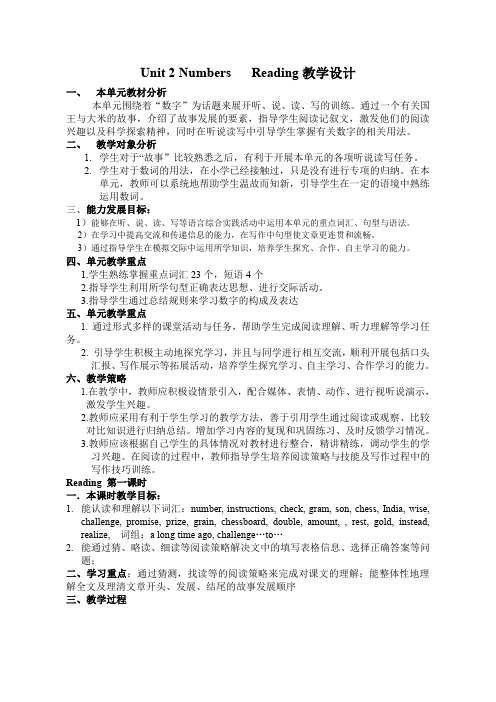
Unit 2 Numbers Reading教学设计一、本单元教材分析本单元围绕着“数字”为话题来展开听、说、读、写的训练。
通过一个有关国王与大米的故事,介绍了故事发展的要素,指导学生阅读记叙文,激发他们的阅读兴趣以及科学探索精神,同时在听说读写中引导学生掌握有关数字的相关用法。
二、教学对象分析1.学生对于“故事”比较熟悉之后,有利于开展本单元的各项听说读写任务。
2.学生对于数词的用法,在小学已经接触过,只是没有进行专项的归纳。
在本单元,教师可以系统地帮助学生温故而知新,引导学生在一定的语境中熟练运用数词。
三、能力发展目标:1)能够在听、说、读、写等语言综合实践活动中运用本单元的重点词汇、句型与语法。
2)在学习中提高交流和传递信息的能力,在写作中句型使文章更连贯和流畅。
3)通过指导学生在模拟交际中运用所学知识,培养学生探究、合作、自主学习的能力。
四、单元教学重点1.学生熟练掌握重点词汇23个,短语4个2.指导学生利用所学句型正确表达思想、进行交际活动。
3.指导学生通过总结规则来学习数字的构成及表达五、单元教学重点1. 通过形式多样的课堂活动与任务,帮助学生完成阅读理解、听力理解等学习任务。
2. 引导学生积极主动地探究学习,并且与同学进行相互交流,顺利开展包括口头汇报、写作展示等拓展活动,培养学生探究学习、自主学习、合作学习的能力。
六、教学策略1.在教学中,教师应积极设情景引入,配合媒体、表情、动作、进行视听说演示,激发学生兴趣。
2.教师应采用有利于学生学习的教学方法,善于引用学生通过阅读或观察、比较对比知识进行归纳总结。
增加学习内容的复现和巩固练习、及时反馈学习情况。
3.教师应该根据自己学生的具体情况对教材进行整合,精讲精练,调动学生的学习兴趣。
在阅读的过程中,教师指导学生培养阅读策略与技能及写作过程中的写作技巧训练。
Reading 第一课时一.本课时教学目标:1.能认读和理解以下词汇:number, instructions, check, gram, son, chess, India, wise,challenge, promise, prize, grain, chessboard, double, amount, , rest, gold, instead, realize, 词组:a long time ago, challenge…to…2.能通过猜、略读、细读等阅读策略解决文中的填写表格信息、选择正确答案等问题;二、学习重点:通过猜测,找读等的阅读策略来完成对课文的理解;能整体性地理解全文及理清文章开头、发展、结尾的故事发展顺序三、教学过程。
初二英语八年级上册第二单元课文
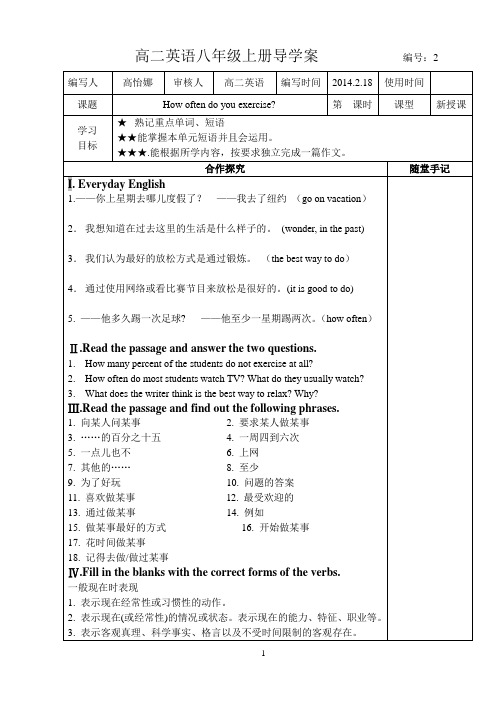
Part three: summary
I am a 17-year-old girl/boy from NO.4High SchoolofJiaozhou.______
______________________________________________________________
She________ (play) computer games one to three times a week and she __________ (go) shopping once a week. On the weekend, she _________ (go) to the movies with her friends. Jane ________ (like) painting, so she draws pictures almost every day.
1.向某人问某事_____________ 2.要求某人做某事_____________
3.……的百分之十五__________ 4.一周四到六次______________
5.一点儿也不_______________ 6.上网_____________________
7.其他的……_______________ 8.至少_________________
17.花时间做某事_________________
18.记得去做/做过某事__________________
Ⅳ.Fill in the blanks with the correct forms of the verbs.
一般现在时表现
1.表示现在经常性或习惯性的动作。
八年级英语 U2-Numbers

Reading
The king and the rice
Read the text and answer the questions.
1. Where was the king from? He was from India.
2. What did the king think about the old man’s requirement (要求)? He thought the old man asked too little for the prize.
wheat or rice. Grain is used for food and
often ground into flour
n. 谷粒
grain
a checkerboard used for playing chess
n. 国际象棋;棋盘 chessboard
to make twice as much or twice as great
v. (使)加倍
double
n. 数量;数额
measure; quantity amount
a piece or part that remains
n. 剩余部分
rest
a soft, heavy, yellow metal that is valuable and used to make jewelry
Lead-in
What do we use numbers for?
We use numbers to … show weight
shteolwl titmheetaenmdpderaatetaunrde so on…
numbers in our life
八年级英语unit2 numbers课文翻译
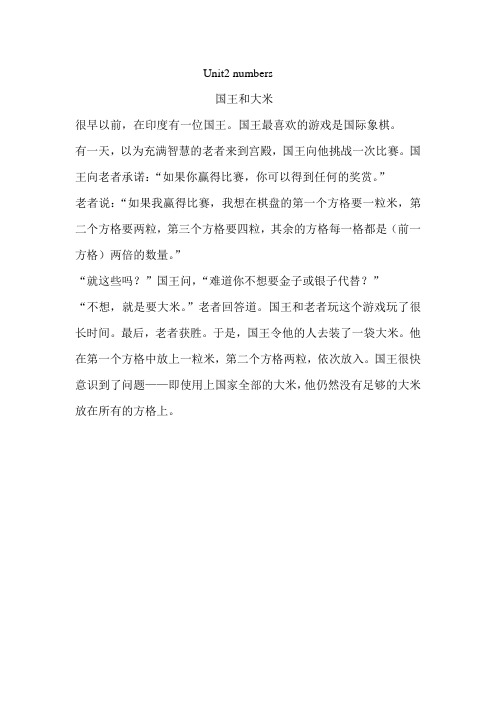
Unit2 numbers
国王和大米
很早以前,在印度有一位国王。
国王最喜欢的游戏是国际象棋。
有一天,以为充满智慧的老者来到宫殿,国王向他挑战一次比赛。
国王向老者承诺:“如果你赢得比赛,你可以得到任何的奖赏。
”
老者说:“如果我赢得比赛,我想在棋盘的第一个方格要一粒米,第二个方格要两粒,第三个方格要四粒,其余的方格每一格都是(前一方格)两倍的数量。
”
“就这些吗?”国王问,“难道你不想要金子或银子代替?”
“不想,就是要大米。
”老者回答道。
国王和老者玩这个游戏玩了很长时间。
最后,老者获胜。
于是,国王令他的人去装了一袋大米。
他在第一个方格中放上一粒米,第二个方格两粒,依次放入。
国王很快意识到了问题——即使用上国家全部的大米,他仍然没有足够的大米放在所有的方格上。
最新8A牛津版Unit 2 Numbers课文及重点教学文案
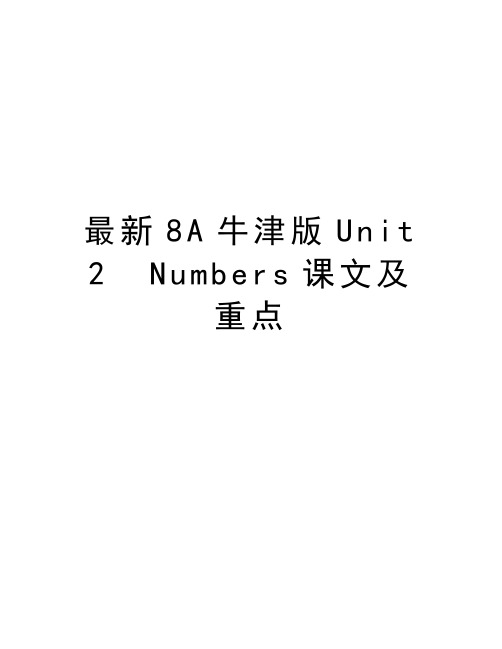
最新8A牛津版U n i t 2N u m b e r s课文及重点Unit 2 NumbersThe king and the riceA long time ago, there was a king in India. The king’s favourite game was chess.One day, an old wise man came to the palace and the king challenged him to a game. The king promised the old man, “ You can have any prize, if you win the game.”The old man said “If I win the game, I’d like one grain of rice for the first square of the chessboard, two for the second, four for the third and then double the amount for each of the rest of the squares.“Is that all?” asked the king. “ Wouldn’t you like gold or silver instead?”“ No, just rice,” replied the old man.The king and the old man played the game for a long time. Finally, the old man won. So the king ordered his men to collect a bag of rice. He put one grain on the first square, two on the second , and so on. The king quickly realized the problem-------even with all the rice in the country, he would still not have enough rice to put on all the squares!1.check in 登记check up 检验check out 办清手续后离开2.基数词+单位名称(metre, feet, kilometer等)+adj(long, wide, high等)3.play chess 下象棋play with 玩耍4.favourite adj. 最喜欢的,(无比较级和最高级)5.one day (过去,将来)的某一天some day (将来)的某一天6.the rest of 剩余的……have a rest 休息下7.promise sb sth 答应给某人某物promise sb to do sth 答应某人做某事make a promise 许诺8.would like sth 想要某物would like to do sth 想要做某事would like sb to do sth 想要某人做某事9.instead (句首,句末)代替,而不是instead of 代替,而不是10.特殊疑问词 +to do11.realize sth 意思到……realize that 意思到……12.enough +n. 或n.+ enough足够多的……Adj+enough 足够……13.talk to sb 和某人谈话(暗含上级对下级的意思)talk with sb 和某人谈话talk about sth 谈论某事14.advice n.(不可数) some advice 一些建议a piece of advice 一条建议give sb advice 给某人建议15. follow/take one’s advice 听从某人的建议16.a bag of ...一包……17.and so on 等等Counting before numbersBefore the invention of written numbers, people used many different ways to count things.At first, people use their fingers, and even their toes. However, they could only count small numbers in this way.After that, they began to make small marks on sticks and bones. This helped them count bigger numbers. They used them to count the days of the month, the amount of food and the number of animals they have.Then people began to use tokens made from clay or small stones. This helped them count even bigger numbers. They often put the tokens on pieces of string so that they could carry them around easily. This developed into tools like the abacus.Finally, people began to develop systems of written marks to show different numbers, and this led to the Hindu---Arabic system(0-9). We are still using this system today.1.at first 起初,开始2. a piece of string 一根绳子3.develop into 发展成……4.lead sb to ...带某人去……lead sb to do sth 带领某人做某事5.agree with sb 同意某人agree to do sth 同意做某事6.not ...any more =no more = not....any longer= no longer不再7.take place 发生 happen 发生8.at once 立刻9.as usual 和往常一样10.keep your dream 坚持你的梦想11.not.....at all 一点也不12.besides 除了……还有except for 除了……(不同类)except 除了……(同类)but 除了13.be late for 迟到14.all year round 全年,整年15.order sb to do sth 命令某人做某事。
2013年外研版八年上册 M1U2课文原文
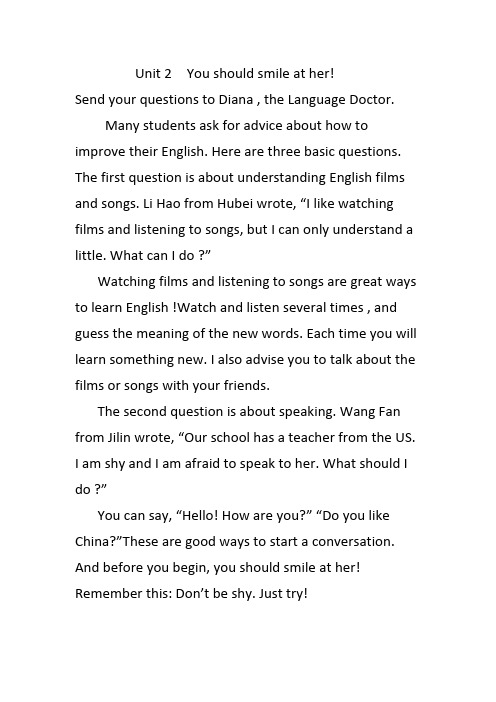
Unit 2 You should smile at her!Send your questions to Diana , the Language Doctor.Many students ask for advice about how to improve their English. Here are three basic questions. The first question is about understanding English films and songs. Li Hao from Hubei wrote, “I like watching films and listening to songs, but I can only understand a little. What can I do ?”Watching films and listening to songs are great ways to learn English !Watch and listen several times , and guess the meaning of the new words. Each time you will learn something new. I also advise you to talk about the films or songs with your friends.The second question is about speaking. Wang Fan from Jilin wrote, “Our school has a teacher from the US.I am shy and I am afraid to speak to her. What should I do ?”You can say, “Hello! How are you?” “Do you like China?”These are good ways to start a conversation. And before you begin, you should smile at her! Remember this: Don’t be shy. Just try!The third question is about vocabulary. Zhang Lei from Anhui wrote, “I write down new words, but I forget them quickly. How can I remember them?”Do not worry. It is natural to forget new words! I suggest you write four or five words a day on pieces of paper and place them in your room. Read the words when you see them, and try to use them.。
2013外研版英语八年级上册全部课文原文
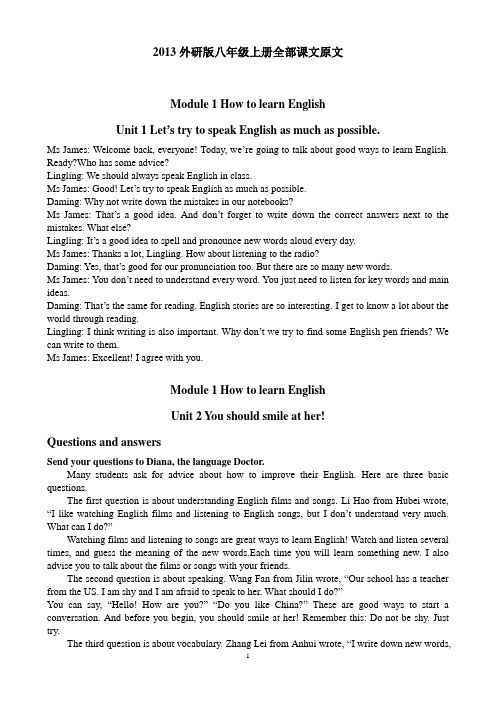
2013外研版八年级上册全部课文原文Module 1 How to learn EnglishUnit 1 Let’s try to speak English as much as possible.Ms James: Welcome back, everyone! Today, we’re going to talk about good ways to learn English. Ready?Who has some advice?Lingling: We should always speak English in class.Ms James: Good! Let’s try to speak English as much as possible.Daming: Why not write down the mistakes in our notebooks?Ms James: That’s a good idea. And don’t forget to write down the correct answers next to the mistakes. What else?Lingling: It’s a good idea to spell and pronounce new words aloud every day.Ms James: Thanks a lot, Lingling. How about listening to the radio?Daming: Yes, that’s good for our pronunciation too. But there are so many new words.Ms James: You don’t need to understand every word. You just need to listen for key words and main ideas.Daming: That’s the same for reading. English stories are so interesting. I get to know a lot about the world through reading.Lingling: I think writing is also important. Why don’t we try to find some English pen friends? W e can write to them.Ms James: Excellent! I agree with you.Module 1 How to learn EnglishUnit 2 Y ou should smile at her!Questions and answersSend your questions to Diana, the language Doctor.Many students ask for advice about how to improve their English. Here are three basic questions.The first question is about understanding English films and songs. Li Hao from Hubei wrote, “I like watching English films and listening to English songs, but I don’t understand very much. What can I do?”Watching films and listening to songs are great ways to learn English! Watch and listen several times, and guess the meaning of the new words.Each time you will learn something new. I also advise you to talk about the films or songs with your friends.The second question is about speaking. Wang Fan from Jilin wrote, “Our school has a teacher from the US. I am shy and I am afraid to speak to her. What should I do?”You can say, “Hello! How are you?”“Do you like China?”These are good ways to start a conversation. And before you begin, you should smile at her! Remember this: Do not be shy. Just try.The third question is about vocabulary. Zhang Lei from Anhui wrote, “I write down new words,but I forget them quickly. How can I remember them?”Do not worry. It is natural to forget new words! I suggest you write four or five words a day on pieces of paper and place them in your room. Read the words when you see them, and try to use them.Module 2 My hometown and my countryUnit 1 It’s tall er than many other buildings.Tony: Hey, Daming! How was your weekend?Daming: Pretty good!I went to Shenzhen.Tony: Where’s Shenzhen?Daming: Well, it’s on the coast near Hong Kong. It was a small village about thirty years ago, but today it’s a very big city.Tony: So it’s a new er city than Hong Kong?Daming: Yes, it’s a very new city. In fact, it only became important in the 1980s. It’s getting big ger and bus ier. Some day it will become as busy as Hong Kong, I’m sure.Tony: What’s the population of Shenzhen?Daming: It’s over ten million, I think. That’s large r than the population of many other cities in China. Its streets are much wider and cleaner too. I think it’s a beautiful city.Tony: I’d like to go there one day.Daming: Remember to visit the Diwang Tower. It’s taller than many other buildings in Shenzhen.Unit 2 Cambridge is a beautiful city in the east of England.Cambridge, London and EnglandBy Tony SmithI come from Cambridge, a beautiful city in the east of England. It is on the River Cam and hasa population of about 120,000. My home town is especially famous for its university. Many famous people studied here, such as Isaac Newton and Charles Darwin. There are lots of old buildings and churches to visit. Students and tourists enjoy trips along the river by boat.Cambridge is 80 kilometres from London. London is in the south of England and it is on the River Thames. It has a population of about seven and a half million, so it is big ger and bu sier than Cambridge. It is about 2000 years old, and it is famous for Big Ben, Buckingham Palace and Tower Bridge.England itself is part of an island, and you are always near the sea. The small villages and beaches on the coast are popular for holidays. Tourists like the areas of low mountains and beautiful lakes in the north, and the hills and pretty villages in the south. Everywhere in England, you will notice how green the countryside is.It is never very hot in summer or very cold in winter. So come and see England any time of the year, but bring an umbrella with you. You will need it most days.Module 3 SportsUnit 1 Nothing is more enjoyable than playing tennis.Daming: Hey, Tony. Come and watch the football match on TV!Tony: OK. What’s the score?Daming: Spain scored a minute ago.Tony: Wow! That’s fast!Daming: That’s right. Last week the match on TV was so boring because no one scored at all. So this week’s match is already more exciting.Betty: What’s the matter with you, Tony? You look tired.Tony: I’m really tired after last night’s tennis match. And I hurt my knee.Daming: That’s too bad! Sit down and watch the match. It’s safer than playing tennis.Betty: Yes, watching is not dangerous and it’s more relaxing too!Tony: Well, I’m not sure about that. Nothing is more enjoyable than playing tennis.Betty: But you enjoyed watching the Olympics on TV, right?Tony: Yes, but that’s because it was cheaper than buying tickets for all the games.Daming: And staying at home was eas ier than going to the stadium. Oh, look at that!Tony: Oh, he missed!Oh, bad luck!Daming: Never mind. There’s still plenty of time for them to score.Unit 2 This year we practice more carefully.Training hardIt is Saturday tomorrow, but I am going to school. I am not going for lessons, but to play football. I am in our school team and we are going to play against another school next week. The practice starts at 10 am. We all arrive as early as we can so that we have time to warm up. We are training hard er than usual because the other team beat us last year. This year we want to do better.It is more difficult to practise in winter because the days are short and the weather is cold too. It gets dark earlier, so it is important not to be late for after-school practice.Our coach is pleased because we are playing better as a team now. Last year we were sometimes careless when we passed the ball and we lost to the other team in the final match. What a pity! This year we are training more carefully. That means we have a better chance of winning.The fan club has few er people this year. We hope to play well so that we have more fans to watch the matches. It is good to have our fans around. They cheer us on loudly and we feel more confident to win the game.Module 4 Planes, ships and trainsUnit 1 He lives the farthest from school.Betty: I was late for school today.Mum: Why? What happened?Betty: I took the bus. There was a road accident, and the traffic was very heavy. But nobody was late, except me. Maybe I should go to school by taxi.Mum: It’s the most comfortable way, but it’s also the most expensive. And taxis are very slow in heavy traffic too.Betty: Then what about going by bike?Mum: That’s a good choice, but it’s a bit dangerous. There’s so much traffic.Betty: But most of my classmates ride bikes, and it’s quite safe. Don’t worry. I’ll be careful. Mum: How does Tony go to school?Betty: He lives the farthest from school, so he takes the underground.Mum: And what about Lingling?Betty: Her home is the closest to school, so she walks.Mum: How about Daming?Betty: He goes by bus too, the same as me. But it’s so crowded! And the traffic is heavy.Mum: All right. You can ride your bike to school, but remember to be careful all the time.Module 4 Planes, ships and trainsUnit 2 What is the best way to travel?Question: What is the best way to travel from London to Amsterdam?I am planning to travel from London to Amsterdam. How long does the journey take and what is the best way to travel? Could you please tell me about the trains or ships to get there? The more information, the better. Thanks!Best answer: There are four ways to travel.A journey by train is more relaxing than by coach, but a lot more expensive. When you go by train, buy your ticket a long time before you travel. It is usually cheaper.You can go by car and by ship across the North Sea. This is the most comfortable way to travel but also the most expensive. Book your ticket before you book your hotel. Remember that parking in Amsterdam is very expensive, so stay outside the city centre and travel in by bus or by train.The third choice is by coach. This is usually the cheapest, but in summer, the coaches sometimes get crowded! And it takes you about twelve hours to get there. However, it will not cost as much as going by train.Finally, you can fly. It is the fastest and the second cheapest, but you may have to wait for hours at the airport because of bad weather.Well, I hope this helps! Have a great trip!Module 5 Lao She TeahouseUnit 1 I wanted to see the Beijing Opera.Betty: Lingling and I went to Lao She Teahouse last night.Tony: How was it?Betty: It was great! You know, I wanted to see the Beijing Opera, so Lingling offered to take me there. We drank tea and watched an opera.Tony: Did you understand the opera?Betty: No, it was difficult to understand the words. But the actors and actresses were excellent. Tony: How long did you stay?Betty: We only planned to watch for an hour, but in the end, we stayed for three hours.Tony: Did you enjoy it?Betty: Well, it was interesting----that’s the main thing. I hope to understand more next time. Tony: Do you often go to see the Beijing Opera, Lingling?Lingling: No, I don’t. I wanted to take Betty to the teahouse because it’s famous.Tony: Who is Lao She?Betty: No idea. Ask lingling.Lingling: Lao She is a great writer. He’s especially famous for his play Teahouse.Module 5 Lao She TeahouseUnit 2 It describes the changes in Chinese society.1. The story of teahouseTeahouse is one of Lao She’s most famous plays. He wrote it in 1957.The play has three acts and shows the lives of common people in China from the end of the nineteenth century to the middle of the twentieth century. It tells us the story of Wang Lifa and the customers of his teahouse in Beijing. It describes the changes in Chinese society over fifty years.2. Lao SheLao She was born in Beijing in 1899. His mother sent him to a teacher’s school in 1913. After finishing school in 1918, he became a head teacher of a primary school. In 1924, Lao She left home and went to England. He taught Chinese at a college in London and returned to China five years later. He wrote many plays, novels and short stories about people’s lives, and was named “the People’s Artist”. Lao She is one of the greatest Chinese writers of the twentieth century.3. Lao She TeahouseAt Lao She Teahouse today, customers can drink tea and eat delicious Beijing food. If you like the Beijing Opera, traditional music or magic shows, you can enjoy them at the teahouse. Lao She Teahouse gives a warm welcome to everyone from all over the world.Module 6 Animals in dangerUnit 1 It allows people to get closer to them.(Lingling and Betty are leaving the zoo. )Lingling: Did you like the zoo?Betty: Yes! I saw the pandas at last! But I am more interested to see the pandas in the Wolong Panda Reserve, because it allows people to get closer to them.Lingling: It’s sad to think of the pandas and other animals in danger.Betty: We need to protect them better.Lingling: Yes. Many wild animals don’t have a safe place to live, because villages and farms are growing bigger and are taking away their land and forests.Betty: Also, often there isn’t enough clean water. I think we all need to help animals live in peace. Look, there’s a notice.Lingling: It says, “Help! We want to save animals in danger, and we need your help.”Betty: But what can we do?Lingling: It says, “Your money pays to look after the animals.” That means we can give money to help protect the animals.Betty: Maybe we can raise some money at school. Let’s find out what else we can do to save asmany animals as possible.Module 6 Animals in dangerUnit 2 The WWF is working hard to save them all.1. An animal in dangerPandas are in danger. There are only about 1,600 pandas living in the wild today. Zoos and research centres are looking after about 340 pandas. Pandas do no have many babies, and baby pandas often die. The situation is getting very difficult. Scientists are doing a lot of research to help pandas produce more babies and help baby pandas live.2. The panda’s homePandas live in the forests and mountains of Southwest China. Each panda needs to eat a lot of bamboo every day. The bamboo forests are getting smaller, so pandas are losing their home.3. Nature parks for pandasIn order to protect pandas in the wild, the government is setting up nature parks and developing other plans. The nature parks will be big and there will be more bamboo to feed the pandas. Pandas born in zoos may go back to live in the nature parks.4. WWF and animals in dangerThe World Wide Fund for Nature (WWF) wants to protect all animals. And it chose the panda to be its symbol. We do not want to lose tigers, elephants or any other animals, so the WWF is working hard to save them all.Module 7 A famous storyUnit 1 Alice was sitting with her sister by the river.Tony: Hi, Lingling!Lingling: Ssh! I’m reading.Tony: Sorry! What’s the book about?Lingling: It’s about a girl called Alice. One day, Alice was sitting with her sister by the river and she saw a white rabbit with a watch. It ran past.Tony: Why was it running?Lingling: Because it was late.Tony: And where was it going?Lingling: To see the Queen of Hearts. Alice followed it and fell down a hole in the ground.Tony: Yes! Then she saw the Cheshire Cat. It was sitting in a tree and smiling at everyone. Lingling: Then Alice arrived at the March Hare’s house. He was sitting with the Mad Hatter and a mouse. They were having a tea party in the garden.Tony: And then Alice met the Queen of Hearts. She was playing a strange game!Lingling: Do you already know the book?Tony: Yes, it’s Alice’s Adventures in Wonderland. Everyone in Britain knows the story.Lingling: Then why did you ask me all those questions?Tony: To see if you remember the story! Ha ha…Module 7 A famous storyUnit 2 She was thinking about her cat.Alice was sitting with her sister by the river and her sister was reading a book. Alice had nothing to do. Once or twice she looked into the sister’s book. “And what is a book for,” thought Alice, “ without pictures or conversations?” Suddenly a white rabbit with pink eyes ran by.There was nothing strange about that. She heard the rabbit say, “Oh dear! Oh dear! I’ll be late!” and she did not think it was strange. Then the rabbit took a watch out of its pocket and looked at it. A rabbit with a pocket and a watch? Alice got up and ran across the field after it. She saw it go down a large rabbit hole in the ground.Then Alice went down after it, but never thought about how she was going to get out again. She found that she was falling down a very, very deep hole. It was too dark for her to see anything. She was falling for a long time. While she was falling, she was thinking about her cat, Dinah. Suddenly she landed on some dry leaves…(The Mad Hatter, the March Hare and the Mouse are having a tea party. Alice arrives and sits down. )March Hare: It wasn’t very polite of you to sit down. We didn’t ask you.Alice: I didn’t know it was your table. Anyway, there are cups of tea for more than three people. Mad Hatter: That’s because it’s always tea time.Alice: I don’t understand.Mad Hatter: We don’t have time to wash the things…March Hare: So we just move around the table…(Mouse sings a song.)March Hare: Stop singing, Mouse!(Mouse stops singing and falls asleep.)Mad Hatter: He’s asleep.Mouse: I wasn’t asleep! I heard every word you were saying.March Hare: Tell us a story!Alice: Yes, please do!Mad Hatter: And be quick. Or you’ll be asleep again before it’s done.Mouse: On ce upon a time, there were three little sisters, and they lived…March Hare: Take some more tea.Alice: I didn’t have any tea, so I can’t have more.Mad Hatter: You mean you can’t take less. It’s very easy to take more than nothing.Alice: Nobody asked you!Mad Hatter: I want a clean cup. Let’s all move one place.( The Mad Hatter moves, and the Mouse follows him. The March Hare knocks the milk over when he is moving into the Mouse’s place. Alice takes the place of the March Hare. Alice is not happy because there is milk on the table in front of her. )Alice: Well, really! This is the stupidest tea party I’ve been to in all my life!StoriesIn the past, not many people could read or write, so people listened to stories. Some stories were popular, and they changed every time someone told them. The stories passed from generation togeneration. Finally, someone wrote them down.For example, in China today people still love old stories like The Monkey King .Some people say that new stories written in books today are not as entertaining as the old ones. Do you agree?Module 8 AccidentsUnit 1 While the lights were changing to red, a car suddenly appeared. Betty: Good morning, Ms James! You look pale. Are you all right?Ms James: I’m OK, but I saw an accident. A boy was riding his bike and listening to music on the road.Daming: That’s very dangerous!Ms James: I was waiting to cross the road. While the lights were changing to red, a car suddenly appeared round the corner. It wasn’t going fast, but it didn’t stop.Lingling: Did the boy stop?Ms James: No. And the driver was talking on his mobile phone.Betty: So did the car hit the boy?Ms James: No, I’m glad to say. The car stopped just in time, but the boy fell off his bike and hurt his knee.Tony: That’s too bad.Ms James: So when you’re on your bike, think about the risk of an accident! Pay attention, stop at the red lights and… what else?Betty: Don’t ride too fast.Daming: Don’t ride side by side with your friends.Ms James: Anything else?All: Don’t listen to music!Module 8 AccidentsUnit 2 I was trying to pick it up when it bit me again.Smile, please!One day, when Henry was working in a restaurant, a snake suddenly appeared and bit his hand.A few days earlier, the snake arrived from Asia in a box of bananas. It climbed out and hid somewhere.“I was trying to pick it up when it bit me again. I threw it across the kitchen, and it landed on a table.”While the snake was lying on the table, Henry quickly picked up his mobile phone and took a photo with it. Then the snake hid behind the fridge.When Henry was trying to find the snake, his hand began to hurt badly. He hurried to hospital. As the doctors were checking him, the pain got worse. But they could not help him because they did not know what kind of snake bit him.As he was lying there in great pain, Henry suddenly remembered the photo. The doctors sent the photo to a zoo. As soon as they learnt what kind of snake bit him, they gave Henry the rightmedicine, and he left hospital the next day.“So if a snake bites you, take out your mobile phone or camera. Take its photo, and show the photo to the doctors,” suggests Henry. “But as you know, the snake won’t smile!”Module 9 PopulationUnit 1 The population of China is about 1.37 billion.Betty: What are you doing?Tony: I’m preparing some notes for a report called “Our growing population.”Lingling: Well, we’re in the right place to talk about that! Beijing is a huge city with a large population. That causes a lot of problems, such as too much traffic and noise.Betty: It’s not only Beijing. Population increase is a big problem in many countries. Do you know how many babies are born every minute in the world?Tony: No. Can you tell me?Betty: Over 250! That makes over 131.4 million births a year.Lingling: I can’t believe it!Betty: The population of China is about 1.37 billion. That’s almost one fifth of the world’s population, that is, about 7 billion.Tony: Hang on a minute! I’ll write that down too!Betty: But in the future, China’s population won’t grow so fast, because families are getting smaller. Lingling: How do you know all this?Betty: I wrote my report yesterday!Tony: Great, thanks! Now I can write my report!Module 9 PopulationUnit 2 Arnwick was a city with 200,000 people.Could it be your town?Jo is fifteen and lives in Parkville. When Jo’s grandparents first came to Parkville, it was a quiet village. They had a small house, close to fields and hills.Parkville was near Arnwick, a city with 200,000 people. People from Parkville moved to Arnwick to find jobs, and they needed places to live. However, it was expensive to live in the city centre, so the government built flats outside the centre. Soon, Parkville became part of Arnwick, and Arnwick became a city with over a million people.Jo’s family lives in one of those flats. It is very crowded, and rubbish is also a problem.The small local school in Parkville closed down five years ago, so Jo now has to go to a school in Arnwick with 2,000 pupils. It takes an hour to get there by bus. There is a lot of traffic and pollution.It is clear that Arnwick needs more schools, buses and hospitals. It needs fresh air, clean water, and better public services. It also needs more police to protect its people. But to do all these things, it needs more money.However, can money help solve all these problems? Do we need more big cities like this? Infact, this is just a story. But it describes what is happening all over the world. Could it be your town some day?Module 10 The weatherUnit 1 It might snow.Betty: Hey, boys!Tony: Hi, Betty. Hi, Lingling. Where are you going?Betty: We’re going to the park to skate. There’s thick ice on the lake. Are you coming with us? Tony: Are you joking? It’s really cold today.Daming: And it’s cloudy too, so it might snow.Lingling: What’s the temperature?Tony: It’s between minus eight and minus two degrees! Winter is colder here than in England. Daming: Is it snowy in England in December?Tony: Not usually, although this year it snowed quite a lot. Most Decembers are wet and rainy. Daming: What’s the weather like in America in winter, Betty?Betty: We have cold winters and hot summers. It’s snowy in New York in winter.Tony: Sounds great! I like sunny weather, and I like snow as well. But I don’t like showers or windy weather.Betty: Me neither. Rainy weather is terrible! I wish I were in Australia now. It’s probably sunny and hot there.Lingling: You can go to Hainan Island if you like sunny weather.Betty: One day I will.Lingling: Come on, better get going! We can skate in the park and get warm.Module 10 The weatherUnit 2 The weather is fine all year round.The US is a very big country. It is about 3,000 miles from the east coast to the west coast, so choose carefully the places to see and the time to go. Bring a map because you may want to travel around.New York and Washington D.C. are good places to visit in May or October, but in winter there is a lot of snow.The best time to visit New England is in September. The weather gets cooler, and the green leaves start to turn gold, then brown. Bring your camera so you can take photos of the autumn trees.California is on the Pacific coast, and the weather is fine all year round. Take your swimming clothes because you might want to go swimming in the sea, even in December.In Seattle, in the northwest, it is not very cold but it rains a lot, so bring an umbrella. In Alaska the days are long and warm in summer, but may be cool in the evening. In winter, Alaska can be very very cold. If you want to visit Alaska, you had better go in summer. Do not forget to bring a warm sweater with you.In Texas and the southeast, it is usually very hot and sunny compared to other places. There are storms from time to time in summer and autumn.。
新版牛津英语八上 unit2 numbers

Unit 2 Numbers9月28号1、基数词的位置:(1)位于another, all之后▲如:Can you have another two cakes? 你还能吃2块蛋糕吗?The boy lost all the five pencils last week.这孩子上周把5枝铅笔全丢了。
(2)位于such和more之前▲如:I can finish reading two such books in two days.两天里我能读完这样的两本书。
Please give me one more apple to eat.请再给我一个苹果吃。
(3)可置于last, next, other之前或之后如:His last two books are written in English.他的后两本书是用英语写的。
注意:Another +基数词=基数词+more▲Eg: another two apples=two more apples2、年月日的表达法:表示某年某月某日按“月份+日期+年份”写,也可以是“日期+月份+年份”,年份前加逗号Eg:on June 24, 1998:在1998年6月24日3. 百分数表达法:基数词+percent“分数/百分数+of+名词”做主语时,谓语动词取决于名词Eg:30℅=thirty percent4. 分数表达法:基数词作分子,序数词作分母,分子超过1,分母加—sEg:1/3 one-third 2/3 two-thirds 3/5 three-fifths5. 年代与年龄表达法(1)“in +the+数词的副词形式”表示年代。
▲Eg:in the 1870s或者in 1870′s(2)“in +物主代词+数词的复数形式”表示“在某人…多岁时”▲Eg:in one′s twenties6.表示钟点半小时用half,一刻钟用a quarter,半小时以内用past,超过半小时用to。
2013版新目标英语八上U-2课件Section_A_2a-2c
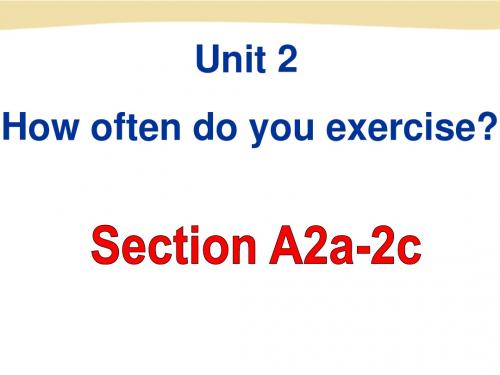
I watch TV every day.
Animal world.
How often do you watch it?
Twice a week.
How often do you use the Internet?
I use the Internet …
What’s your favorite website?
Activities a. go to the movies b. watch TV c. shop
How often every day
once a week twice a week
three times a week
d. exercise e. read
once a month twice a month
根据提示完成下面问题。
1. We drink milk every day.
How often do you drink milk? (对划线部分 _________
提问。)
2. ---How often do you play football?
--- _________. (选出正确答案)
A. Once a week C. Very well B. In the evening D. Twice
5. (2011北京) --- ____ do you play football --- Once a week. A. How much B. How long C. How often D. How far 6. (2011浙江宁波) — _____ do you have an Art Festival in your school? — Once a year. A. How long B. How often C. How far D. How soon
最新2013八上英语 U2 课文
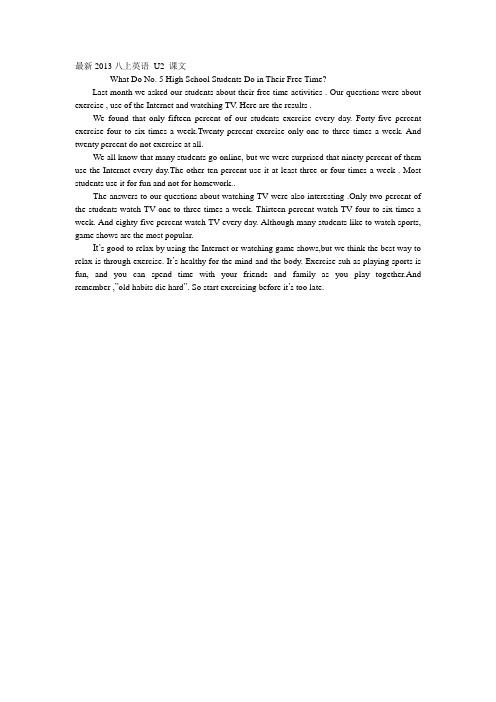
最新2013八上英语U2 课文What Do No. 5 High School Students Do in Their Free Time?Last month we asked our students about their free time activities . Our questions were about exercise , use of the Internet and watching TV. Here are the results .We found that only fifteen percent of our students exercise every day. Forty-five percent exercise four to six times a week.Twenty percent exercise only one to three times a week. And twenty percent do not exercise at all.We all know that many students go online, but we were surprised that ninety percent of them use the Internet every day.The other ten percent use it at least three or four times a week . Most students use it for fun and not for homework..The answers to our questions about watching TV were also interesting .Only two percent of the students watch TV one to three times a week. Thirteen percent watch TV four to six times a week. And eighty-five percent watch TV every day. Although many students like to watch sports, game shows are the most popular.It’s good to relax by using the Internet or watching game shows,but we think the best way to relax is through exercise. It’s healthy for the mind and the body. Exercise suh as playing sports is fun, and you can spend time with your friends and family as you play together.And remember ,”old habits die hard”. So start exercising before it’s too late.。
新颖版广州8年级上册unit2Numbers
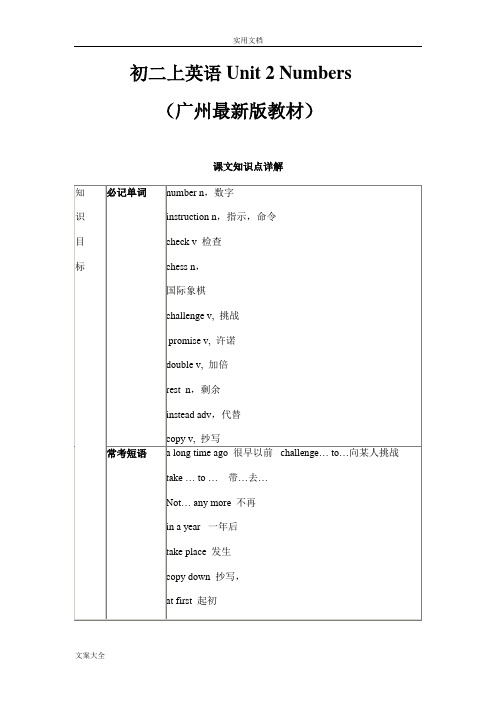
初二上英语Unit 2 Numbers (广州最新版教材)课文知识点详解Getting ready1, read a story about numbers. 读一个关于数字的故事。
(P17) Number 此处用作可数名词,意为数字,number 还可以表示“号码”Eg: We often use Arabic numbers in our daily life.在我们的日常生活中我们经常使用阿拉伯数字。
What’s your telephone number?你的电话号码是多少?【拓展】number还可以用作及物动词,意为“标序号,给…编号”Please number the pictures. 请给这些图片编上序号。
2,Check some Maths problems. 检查一些数学题。
(1) check 及物动词,意为“检查,核实”。
Our teachers check our homework every day. 我们的老师每天都检查我们的作业。
Please check the answers. 请核对答案。
【拓展】check 的相关短语Check in 登记,检票 check out 办清手续后离开,check up 检验(2) problem 可数名词,意为:问题,难题。
He worked out the Maths problem. 他算出了那道数学难题。
These are the problems of youth. 这些是青少年的问题。
辨析:problem 与question【拓展】(1) have problem (in) doing sth. 做某事有困难。
They have some problems (in) getting there on time. 他们准时到达那儿有些困难。
(2) No problem. 没问题---Can you help me? 你能帮助我吗?---No problem. 没问题。
广州新版八年级unit2numbers数词讲解
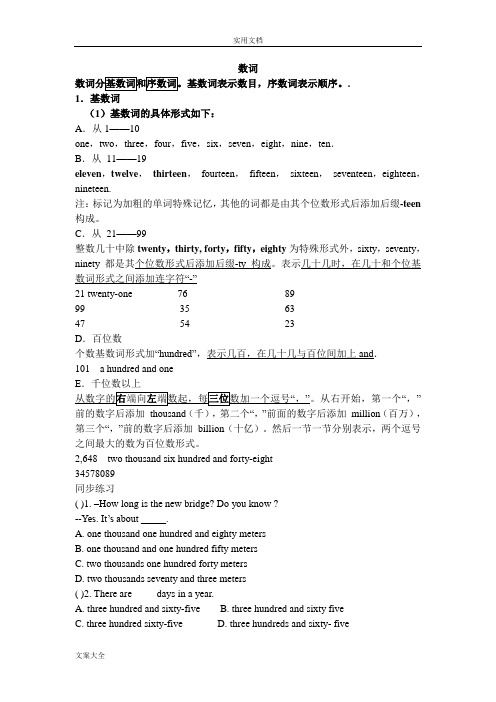
数词数词分基数词和序数词。
基数词表示数目,序数词表示顺序。
.1.基数词(1)基数词的具体形式如下:A.从1——10one,two,three,four,five,six,seven,eight,nine,ten.B.从11——19eleven,twelve,thirteen,fourteen,fifteen,sixteen,seventeen,eighteen,nineteen.注:标记为加粗的单词特殊记忆,其他的词都是由其个位数形式后添加后缀-teen 构成。
C.从21——99整数几十中除twenty,thirty, forty,fifty,eighty为特殊形式外,sixty,seventy,ninety都是其个位数形式后添加后缀-ty构成。
表示几十几时,在几十和个位基数词形式之间添加连字符“-”21 twenty-one 76 _____________ 89_______________99_____________ 35_______________ 63_________________47______________ 54________________ 23__________________D.百位数个数基数词形式加“hundred”,表示几百,在几十几与百位间加上and.101 a hundred and oneE.千位数以上从数字的右端向左端数起,每三位数加一个逗号“,”。
从右开始,第一个“,”前的数字后添加thousand(千),第二个“,”前面的数字后添加million(百万),第三个“,”前的数字后添加billion(十亿)。
然后一节一节分别表示,两个逗号之间最大的数为百位数形式。
2,648 two thousand six hundred and forty-eight34578089__________________________________同步练习( )1. –How long is the new bridge? Do you know ?--Yes. It’s about _____.A. one thousand one hundred and eighty metersB. one thousand and one hundred fifty metersC. two thousands one hundred forty metersD. two thousands seventy and three meters( )2. There are ____ days in a year.A. three hundred and sixty-fiveB. three hundred and sixty fiveC. three hundred sixty-fiveD. three hundreds and sixty- five( )3. Nanjing is a city with many places of interest. ___ tourists come here every year.A. Thousand ofB. ThousandC. ThousandsD. Thousands of( )4. –How many people are there in Changsha?--About six _____.A. millionB. millionsC. millions of( )5.—How many people will come to Beijing for the Olympic Games in 2008?--It’s hard to say. _____ people, I think.A. Million ofB. Millions ofC. Two millions ofD. Two million of(2)基数词的用法A.基数词在表示确切的数字时,不能使用百、千、百万、十亿的复数形式;但是,当基数词表示不确切数字,如成百、成千上万,三三两两时,基数词则以复数形式出现。
- 1、下载文档前请自行甄别文档内容的完整性,平台不提供额外的编辑、内容补充、找答案等附加服务。
- 2、"仅部分预览"的文档,不可在线预览部分如存在完整性等问题,可反馈申请退款(可完整预览的文档不适用该条件!)。
- 3、如文档侵犯您的权益,请联系客服反馈,我们会尽快为您处理(人工客服工作时间:9:00-18:30)。
Part1 Unit2 Numbers
Reading
The king and the rice
A long time ago, there was a king in India. The king’s favourite game was chess.
One day, a wise old man came to the palace and the king challenged him to a game. The king promised the old man, “You can have any prize if you win the game.”
The old man said, “If I win the game, I’d like one grain of rice for the first square of the chessboard, two for the second, four for the third, and then double the amount for each of the rest of the squares.”
“Is that all?” asked the king. “Wouldn’t you like gold or silver instead?”
“No, just rice,” replied the old man.
The king and the old man played the game for a long time. Finally, the old man won. So the king ordered his men to collect a bag of rice. He put one grain on the first square, two on the second, and so on. The king quickly realized the problem—even with all the rice in the country, he would still not have enough rice to put on all the squares!
Part2 More practice
Counting before numbers
Before the invention of written number, people used many different ways to count numbers.
Before the invention of written numbers, people used many different ways to count things.
At first, people use their fingers, and even their toes. However, they could only count small numbers in this way. After that, they began to make small marks on sticks and bones. This helped them count bigger numbers. They used them to count the days of the month, the amount of food and the number of animals they have.
Then people began to use tokens made from clay or small stones. This helped them count even bigger numbers. They often put the tokens on pieces of string so that they could carry them around easily. This developed into tools like the abacus.
Finally, people began to develop systems of written marks to show different numbers, and this led to the Hindu---Arabic system(0-9). We are still using this system today.。
